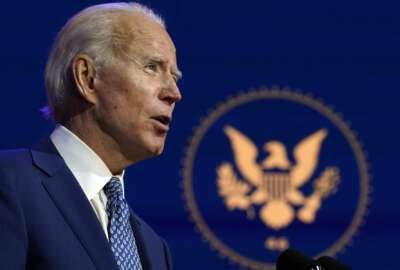
Hubbard Radio Washington DC, LLC. All rights reserved. This website is not intended for users located within the European Economic Area.
Hubbard Radio Washington DC, LLC. All rights reserved. This website is not intended for users located within the European Economic Area.
President-elect Biden has promised unions he'll repeal the 2018 executive orders designed to limit collective bargaining and official time. But simply repealing...
Federal employee unions are counting on President-elect Joe Biden to quickly repeal a trio of 2018 executive orders once he takes office in January.
But that’s only the first step. Simply repealing them isn’t enough to undo the damage federal unions say they caused.
“When it comes to federal employee rights, we don’t think the Trump administration was able to do anything that can’t be undone,” Tony Reardon, national president of the National Treasury Employees Union, told reporters Tuesday. “It’s going to take some work beyond just rescinding the executive orders, but the damage is not permanent.”
Though rescinding President Donald Trump’s 2018 executive orders on employee firings, collective bargaining and official time may eliminate the pressure on agencies to gut existing contracts, a quick repeal won’t immediately address collective bargaining disputes that have been ongoing for years.
NTEU, which on Tuesday released a series of transition recommendations for the incoming Biden administration, pointed to its ongoing disagreements with the Department of Health and Human Services as an example.
HHS had revived previously-stalled negotiations with NTEU shortly after Trump signed the 2018 executive orders. The two parties exchanged proposals, but HHS declared impasse after the department and union met to discuss them.
The Federal Service Impasses Panel ruled on some of those proposals and HHS began imposing them on the union without NTEU’s agreement. To date, the union says it doesn’t have a final contract with HHS. There are still a handful of bargaining articles the two parties haven’t negotiated, and an arbitrator last year said HHS had improperly imposed the panel’s decision on NTEU. It ordered both parties to return to the bargaining table.
But with a new administration, and new leadership at HHS, the union said it’s hopeful the department will reconsider its bargaining position and simply start over.
“What we would like to see… is for HHS to return to the bargaining table and start up fresh,” said Jim Bailey, NTEU’s national executive vice president. “That’s perfectly within their legal ability to do that, and it would be good way for them to settle or resolve the pending litigation we have over their imposition of the panel decision.”
The American Federation of Government Employees has said it’s hoping for a similar outcome with its ongoing contract disputes at the Department of Veterans Affairs. AFGE, which represents the majority of VA employees, has a lengthy list of lawsuits, unfair labor practice complaints and other appeals pending over the VA contract.
NTEU is hopeful the Environmental Protection Agency would also agree to revisit its contract.
“Without the executive orders, the agency is no longer under pressure to gut the contract,” Reardon said. “What we’re hoping for at EPA is to really get back to a place where we can sit down at the table and where we can actually bargain in good faith as soon as possible.”
Not all agencies reopened contracts or changed the way they interacted with their unions because of the president’s executive orders, said Steve Lenkart, executive director of the National Federation of Federal Employees.
He said the Defense Department, for example, remained relatively stable in its dealings with NFFE. Others took a different approach.
“Of all the departments, probably the Department of Veterans Affairs was the most aggressive against unions,” Lenkart said. “That really was coming less from local management and more from politicals in VA and outside VA, even outside of government.”
Where relationships between labor and union got tense or heated, unions believe they can be restored. Many labor organizations have long histories with career agency officials who bargain on behalf of their departments.
“It’s probably going to take some more guidance and maybe some external help from upper-level political sources to say that it’s the desire of the Biden administration that we again strengthen and put in place those relationships we have as labor. Labor is an important partner, so whatever was broken, let’s get that together,” Lenkart said. “That’s the message that we would like to see out of the White House, and it might take something like that to repair some of those relationships. Certainly damage was done in places like the VA, but I don’t think it’s anything that can’t be fixed.”
NTEU also is hopeful a new administration — with new agency officials in place — will set a new tone with collective bargaining.
“It’s important for the Biden administration to be very clear with agencies what their expectation is of them in how they lead and manage their workforces,” said Reardon, who acknowledged NTEU may have to rebuild relationships with agency labor officials where trust had dissipated. “Part of that, of course, extends to the bargaining table.”
Setting a new tone should also extend the Federal Service Impasses Panel and the Federal Labor Relations Authority, unions believe.
The Federal Workers Alliance, a coalition of employee unions that includes NFFE, listed 10 actions a Biden team could take in the next administration. Giving the FSIP a “fresh start” was one of those recommendations, which the group described in an August letter to the Biden team.
The FSIP’s 10 members are presidentially-appointed and don’t need Senate confirmation, though the American Federation of Government Employees has argued in multiple lawsuits that the appointment scheme for the panel members is unconstitutional.
Both NTEU and the Federal Workers Alliance recommended Biden immediately remove all members of the impasses panel and appoint new ones.
The panel hasn’t rubber-stamped all agency bargaining proposals. The FSIP, for example, settled a dispute with the Social Security Administration over telework in NTEU’s favor. It allowed AFGE some office space in its recent decision with the VA.
Still, the panel has largely upheld proposals from agency management when settling collective bargaining disputes.
Bob Tobias, a former NTEU president and professor at American University’s Key Executive Leadership Program, said a panel with new members could quickly shift the tone and dynamic of labor-management interactions, because agencies will no longer be emboldened to take their disputes to the impasses panel.
“If you’re really thinking about what the end play is, you have to think about what’s going to be involved in the end play. If it’s people who follow the direction of the president and the executive orders that’s one thing,” he said. “If it’s populated with people who are professionals and understand what it takes to create a labor-management relationship and what it takes to create a collective-bargaining agreement that is focused on problem solving, not winning and losing, you get a different result.”
Reconfiguring the Federal Labor Relations Authority, another union priority, is more challenging.
The authority has three members, and each serve for a fixed, five-year term. The term for Colleen Kiko-Duffy, the FLRA chairman, expires in 2022.
Ernest DuBester, the lone Democrat on the FLRA, is serving in holdover capacity through mid-2021. Both NFFE and NTEU have called on Biden to reappoint DuBester to the authority. NTEU suggested he serve as FLRA chairman.
The Federal Workers Alliance went as far to suggest that Kiko-Duffy and Jim Abbott, the other Republican member of the FLRA, could be removed for cause by the president-elect.
“The president may remove members of the FLRA for cause after providing notice and hearing,” the alliance wrote. “The current Republican majority in the FLRA has managed to reverse basic tenets relied on by federal sector practitioners over the last 30 years and greatly limited federal sector unions’ ability to attain relief when an agency violates the contract or law.”
If the president-elect doesn’t remove the current FLRA members, unions are urging the incoming administration have nominees ready to fill their positions, as well as the long-vacant FLRA general counsel position, as soon as possible.
The FLRA has been without a general counsel for much of the last four years and hasn’t been able to prosecute agencies when they commit an unfair labor practice.
The authority has issued several decisions in recent years that unions say have reversed years of precedent. One, for example, allows dues-paying employees to cancel automatic payments to federal unions at any time, instead of the once-annual window they had in the past.
NTEU is keeping a list of decisions and final orders the Federal Labor Relations Authority has released in recent years.
“When the makeup of the FLRA changes, we already have cases identified and in the pipeline that are moving forward that will present an opportunity for a different FLRA majority to overturn those,” Bailey said.
Copyright © 2024 Federal News Network. All rights reserved. This website is not intended for users located within the European Economic Area.
Nicole Ogrysko is a reporter for Federal News Network focusing on the federal workforce and federal pay and benefits.
Follow @nogryskoWFED

